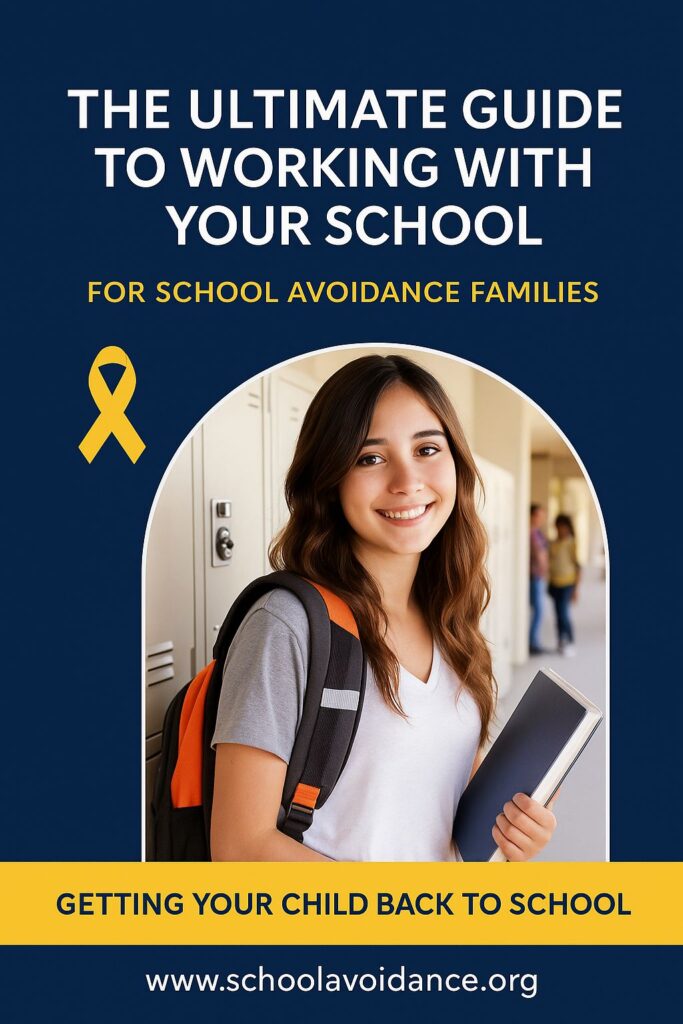School avoidance/school refusal is not a clinical diagnosis. It is a symptom of an emotional disorder or other underlying issues which propels the avoidance.
Therefore, there is no diagnostic code for school avoidance in the Diagnostic and Statistical Manual of Mental Disorders, 5th Edition: DSM-5, which is the definitive authority that defines and classifies mental health disorders.
School avoidance/school refusal is not a clinical diagnosis. It is a symptom of an emotional disorder or other underlying issues which propels the avoidance.
Therefore, there is no diagnostic code for school avoidance in the Diagnostic and Statistical Manual of Mental Disorders, 5th Edition: DSM-5, which is the definitive authority that defines and classifies mental health disorders.
Kids who have school avoidance don’t want to feel this way. Many kids themselves can’t explain what is driving their school avoidance. They want help, hope, and support and shouldn’t be treated with punitive measures.
Sometimes school avoidance is caused by bullying. If bullying is not handled correctly by the school or resolved to the level of comfort necessary for your child, of course, going to school is going to feel uncomfortable.
As with any problem that your child encounters, you must take quick action to get your school to respond quickly and correctly. This Stop Bullying website managed by the U.S. Department of Health and Human Services has beneficial information and resources for families.
The challenges of school avoidance are often magnified by the lack of understanding among friends, family, and sometimes your school. It can be isolating and scary.
Getting support from others who understand exactly how you feel is an important factor to help you keep up your strength, advocacy, and sanity for your child. And, of course, you didn’t cause this.
The relationship and communication between you and your school are pretty darn important. We have a whole page dedicated to helping you navigate your partnership with the school.
We discuss who within the school can help you, your rights, accommodations, and modifications that will help your child’s reintegration to school, and strategies your school can employ.
The words are simple, but the meaning is crucial.
Parents are their kids’ greatest advocates. And school avoidance can seem daunting at times.
Just like our kids, we are humans. Sometimes we may procrastinate, avoid or justify potential red flags because it is freakin scary and seems overwhelming.
When it comes to your kids, your instincts and gut feelings are usually right. So, listen to them and reach out for help.
This is why we are here (the school avoidance alliance); to help you and support you along the way.
Hang in there. You are your child’s greatest advocate, and you know your child better than anyone.
Your school may tell you that all is well at school or that they don’t think there is a problem.
Don’t let this throw you off track,
remember, you know your child best!
The same is true when you consult with a therapist or doctor. Don’t let their degree cause you to second guess yourself.
You know your child best!
Unfortunately only a small percentage of school professionals, therapists, educational advocates and policy makers understand school avoidance best practices. So, you must become the expert to ensure your child is getting:
The time passing slowly without progress is the worst feeling. It wouldn’t have taken five years of suffering and uncertainty if I had this expert guidance during my son’s school avoidance. We would have saved $29,000 in lawyer fees and $69,000 for private schools.
